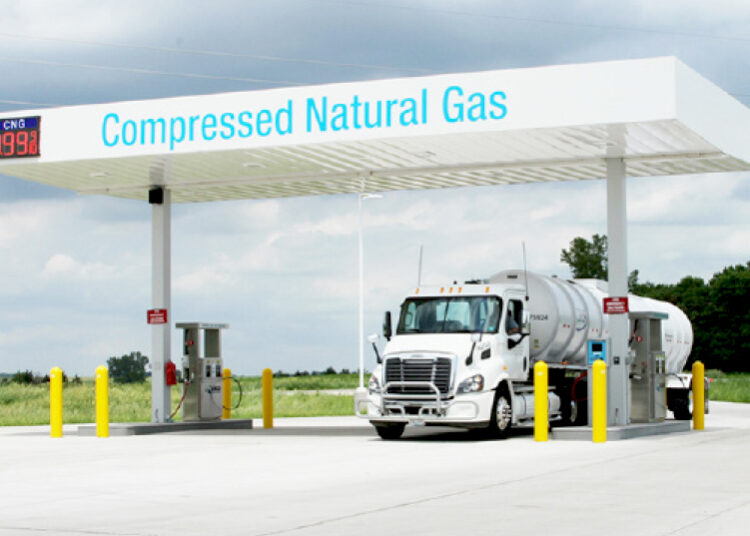Nigeria’s Compressed Natural Gas (CNG) crisis has reached a critical point, with motorists now being forced to sleep at filling stations in long queues to convert their vehicles or refill their cylinders.
Reports of a shortage of the product have exacerbated this dire situation, leaving many drivers stranded and frustrated.
Commercial vehicle drivers and other potential users are raising concerns over inadequate infrastructure for conversion and refuelling and the high cost of kits for a seamless transition to the CNG-power system for their vehicles.
Drivers and owners of CNG-powered vehicles in the Federal Capital Territory (FCT), Abuja, Lagos, Ogun, and other parts of Nigeria complain about inadequate product dispensing. The situation forces them to spend hours, sometimes nights, in long queues at filling stations to power their vehicles.
Despite increased awareness of using CNG as an alternative fuel, stakeholders have expressed their frustrations over the scarcity of CNG conversion centres and refuelling stations across the country
In the prevailing circumstances, government’s plan to transition from petrol to CNG as a cleaner and more affordable fuel alternative faces significant challenges.
The scarcity of CNG conversion centres and inadequate filling stations have left motorists frustrated and uncertain about the future of this initiative. Only 51 CNG refuelling stations are available nationwide, serving over 200 million people. Obviously, in our opinion, this number is far from adequate.
The demand for CNG has steadily increased as motorists seek a more cost-effective and environmentally friendly alternative to traditional gasoline. However, the infrastructure to support this surge in demand has not kept pace, leading to the current crisis.
The shortage of CNG is not only inconveniencing motorists but also impacting businesses that rely on the fuel for their operations.
Public transportation, delivery services, and other essential services are being hampered by the insufficient availability of CNG, leading to disruptions in daily life for many people.
We persuaded, therefore, to urge the relevant authorities to urgently address this crisis. We are compelled to argue that expedited action needs to be taken to increase the production and distribution of CNG to meet the growing demand. Additionally, efforts should be made to streamline the conversion process for vehicles to CNG, so as to reduce the long queues at filling stations.
It is worth noting that the Presidential Compressed Natural Gas Initiative (PCNGI) has been instrumental in expanding CNG adoption, with over 170 conversion centres established nationwide. It said the government intends to raise the number to 500 by the end of 2025.
There are also plans to increase the number to 150 CNG stations by the end of 2025.
Despite these efforts, the current scarcity of filling stations remains a major challenge for the widespread adoption of CNG in Nigeria. However, we blame the government for not adequately addressing the infrastructure needs for CNG. Without sufficient filling stations, the initiative will struggle to achieve its targets.
The PCNGI argues that the government has no input in setting up CNG filling stations, as the initiative is private sector-driven. But we want to remind the government that it introduced CNG as a cheaper and cleaner alternative for Nigerians after President Bola Ahmed Tinubu
removed the petrol subsidy in 2023, leading to a rise in the prices of petroleum products.
If the government has forgotten, we still remember all the mouth-watering offers. Nigerians were offered free conversions for unionised commercial vehicles, subsidised CNG conversions for e-hailing taxis, and loans to individuals to facilitate access. In July 2024, the government commissioned six refuelling stations to serve Abuja and Lagos State residents.
Many Nigerians are asking how the government can push people to convert their cars without adequate preparation on how these cars will
be refilled.
The government must also invest in alternative energy sources to reduce the country’s dependence on CNG. This will help alleviate the current crisis and ensure a more sustainable energy future for the nation.
The country’s current CNG crisis is a pressing issue that requires immediate attention and action. The government, industry stakeholders, and consumers must work together to find solutions and ensure a reliable and sustainable energy supply for all.
Even more disconcerting is the uncertainty around the CNG initiative.
The government must work towards correcting the misconceptions and providing the needed infrastructure. Failure to do so will only lead to further disruptions and hardships for motorists and businesses nationwide.





